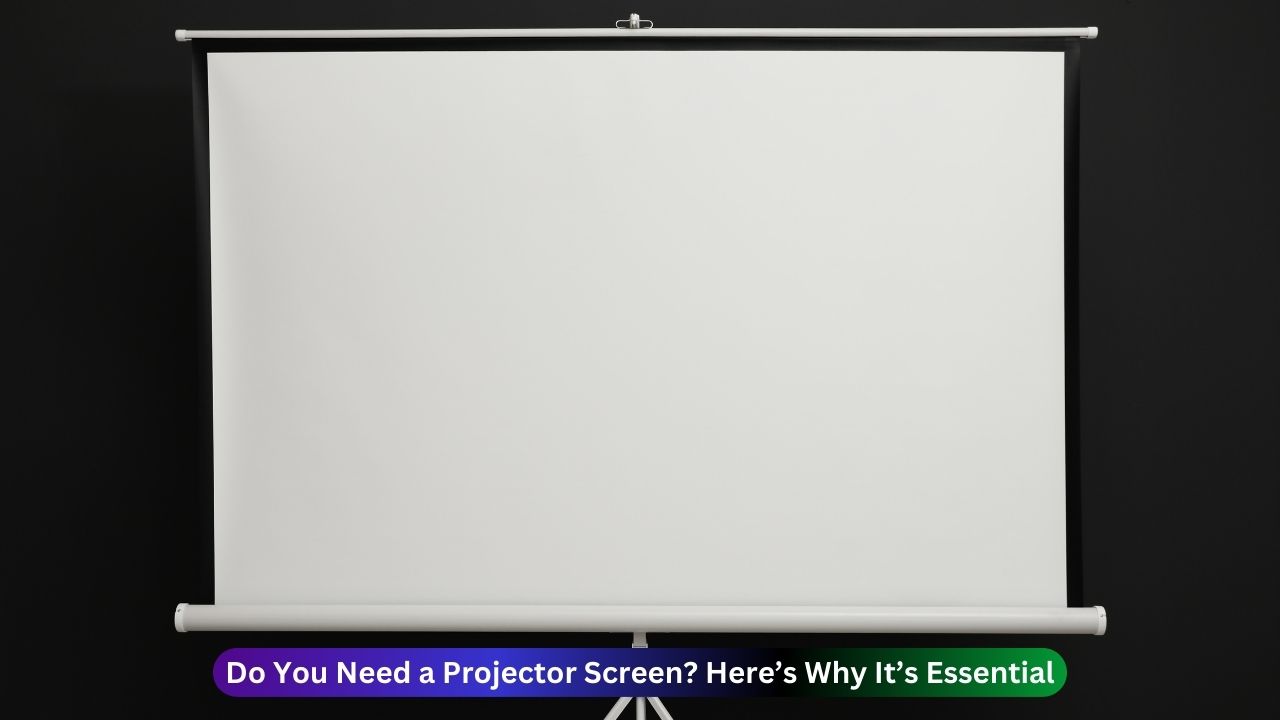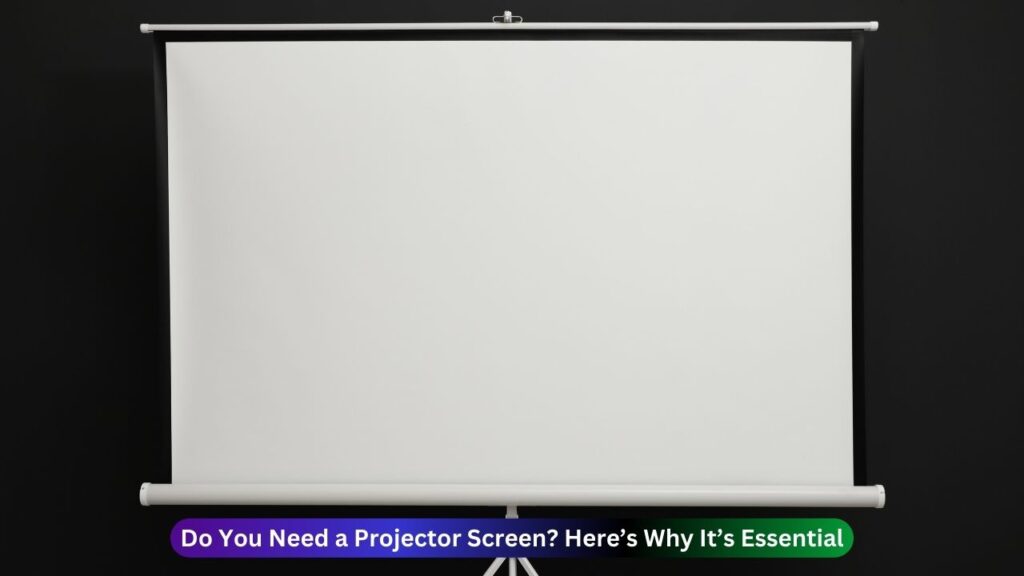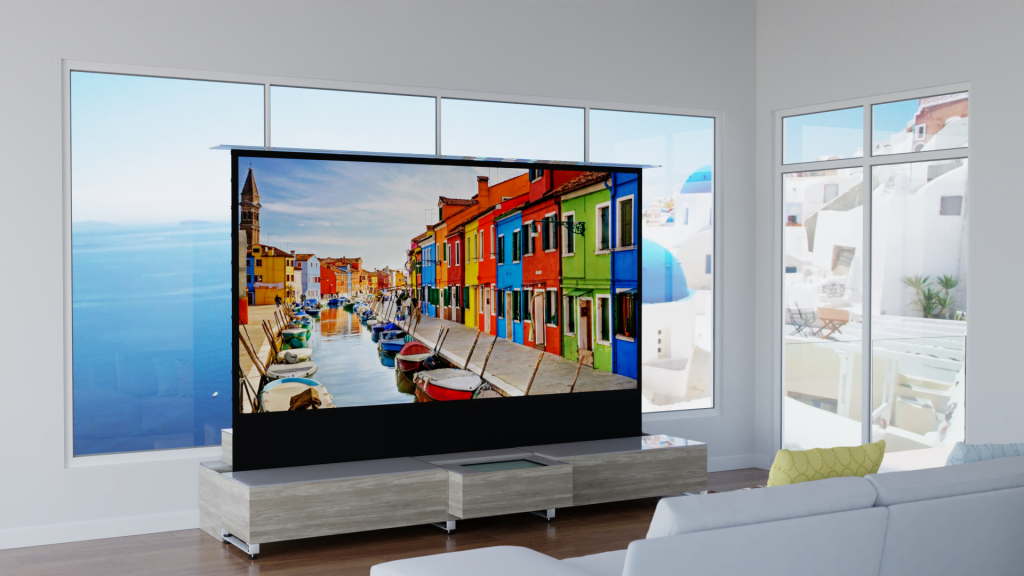

Projectors are now essential for home theaters and presentations. A big question arises—do you need a projector screen? The answer is simple. Yes, it’s vital. Let’s explore why.
- They reduce glare, improving the viewing experience. Distortion is minimized for better visuals. Screen materials ensure even brightness distribution.
- They’re unmatched for outdoor setups. Walls fail to provide cinematic quality, while screens perfectly elevate every scene.
- Presentations also benefit from professional-grade screens. They boost visual impact and engagement. A screen transforms ordinary viewing into extraordinary moments.
Reason Why Do You Need A Projector Screen For A Projector
Understanding the basics is essential when looking for a projector screen or wanting to know more with a curious mind. Here’s a detailed exploration of why a projector screen is often essential.
Improved Image Quality
A projector screen ensures sharp, vivid visuals. Its smooth surface reflects light evenly, preventing distortion and enhancing clarity. Walls with textures or uneven surfaces distort images. Screens maintain vibrant colors without alterations. Paint or wall textures often dull projected colors. A screen ensures accurate, true-to-life visuals.
Enhanced Brightness
Projector screens amplify brightness with specialized materials. This feature is vital in bright rooms or outdoors. Walls cannot effectively boost light reflection. Screens create brighter images for any environment. Daytime movie nights or presentations benefit greatly from this.
Perfect Aspect Ratios and Sizes
Screens are tailored to match aspect ratios, like 16:9. This preserves the original cinematic feel. Walls often crop or distort such images. Screens also offer various sizes to fit your space. Whether small rooms or outdoor events, they adapt easily.
Wide Viewing Angles
Screens deliver clear visuals from any seating position. Quality screens prevent image loss at side angles. Everyone in the room sees sharp, consistent images. Walls fail to offer this flexibility.
Portability and Flexibility
Portable screens are lightweight and easy to move. They are ideal for outdoor movie nights or business trips. Setting up is quick, making them versatile and convenient.
Ambient Light Rejection (ALR)
Advanced screens block ambient light effectively. They keep images bright in well-lit spaces. This feature removes the need for full darkness. Enjoy crisp visuals even in bright rooms.
Easy Maintenance
Projector screens are easy to clean and durable. A simple wipe keeps them in top condition. Unlike walls, they don’t need frequent repainting. Their longevity saves effort and costs.
Types of Projector Screens
Understanding the different types of projector screens can help you make an informed decision based on your specific needs:
| Type | Description | Best For |
| Fixed Frame Screens | Permanently mounted screens that provide excellent tension and flatness. | Home theaters |
| Pull-Down Screens | Manually or motorized screens that retract when not in use. | Versatile spaces |
| Portable Screens | Lightweight and easy to transport; ideal for travel and outdoor use. | Outdoor movies and presentations |
| Rear Projection Screens | It allows projection from behind the screen; it is great for presentations. | Professional settings |
How to Buy a Projector Screen: A Buying Guide
Assess Your Needs
Decide the main purpose of the screen. Is it for movies, presentations, or outdoor use? Knowing this helps you choose the right screen type.
Choose the Right Size
Measure the space and seating distance carefully. Bigger screens enhance immersion but need sufficient room. Always match the screen size to your projector’s capacity.
Select the Aspect Ratio
The aspect ratio affects how content fits the screen. For most home setups, 16:9 is best. It’s ideal for movies and shows without cropping or distortion.
Material Matters
The screen material affects brightness and clarity. Matte white works for general use. ALR material is better for bright rooms. Specialized fabrics enhance colors in demanding setups.
Consider Installation Type
Installation depends on your space and needs. Fixed frames offer premium image quality with perfect tension. Pull-down screens provide flexibility for shared spaces. Portable screens suit those frequently on the move.
The Benefits of Upgrading to 4K Projector Screens

Upgrading to 4K screens enhances your visual experience. They deliver four times more pixels than HD screens. This results in sharper images with vivid, lifelike colors. Every scene feels rich in detail and clarity.
4K projectors with premium screens support larger displays. Unlike TVs, they maintain excellent image quality at any size. This makes them ideal for creating a home cinema. The immersive visuals bring movies and games to life, offering unmatched entertainment.
Rear Projection Screens: A Unique Option
Rear projection screens provide a space-saving alternative. They project images from behind the screen, not in front. This allows vibrant visuals even in brighter spaces.
These screens also offer wider viewing angles. Everyone in the room gets a clear picture. Colors appear more accurate, ensuring a consistent experience. Rear projection suits modern setups with limited space or unique design needs.
Portability and Flexibility
Portable screens are perfect for outdoor and mobile use. These lightweight screens are easy to set up. They take just minutes to assemble or pack away. Whether hosting backyard movie nights or presenting on the go, they deliver reliable image quality. Portability ensures your experience isn’t compromised, no matter the location.
The Importance of Ambient Light Rejection
ALR screens are ideal for bright environments. They minimize glare from ambient light sources. This technology reflects only the projector’s light. It keeps images vibrant and sharp, even in well-lit spaces. ALR screens are perfect for daytime use or rooms with open windows.
FAQs
Can You Use a Projector Without a Screen?
Yes, but the quality will be significantly lower. The walls will lack the smoothness and reflectivity associated with projector screens. The textures and colors of walls will distort the images, often leading to hazy and uneven visuals. So, a proper screen is integral to giving the best possible experience.
Do You Really Need a Projector Screen?
A projector may work without a screen. However, this will severely limit image quality. A plain white wall may appear to provide an acceptable substitute. But walls do not reflect light well enough for an effective image. Light is absorbed, and colors are skewed so the image turns out dull and uneven. A projector screen enhances brightness, clarity, and color accuracy.
Can You Use a Projector Without a Screen?
A blank wall may temporarily work for casual use. Portable setups may also use white surfaces in a pinch. But for high-quality viewing, a projector screen is essential. Screens counter ambient light and offer smoother, sharper images. They ensure the full potential of your projector is realized.
What is the Point of a Projector Screen?
A projector screen helps optimize the quality of images that the projector throws onto them. Screens equally reflect light to give clean and colorful visuals. In contrast to a wall, screens enhance clarity, especially with high-definition content. A projector screen becomes mandatory while projecting 4K or highly detailed images. This makes viewing quite immersive and professional.
Why Do People Buy Projectors?
Projectors allow you to easily manipulate the dimensions of the projection. Unlike televisions, they can adapt to any space or personal preference. You can easily project either the smallest or biggest version. This makes projectors an excellent choice for home theaters or particular situations when viewing needs vary.
Conclusion
Still have confusion about do you need a projector screen? A projector screen completely changes the way you view your content. It upgrades the image quality, therefore enhancing viewing angles. The portability of some is an additional convenience alongside the availability of screens in every occasion and setting.
Whether used for home theaters or outdoor shows, a screen uplifts your set. The worthy investment in a screen elevates the visual experience. The upgrade is the finest for extra sharp and rich entertainment.
